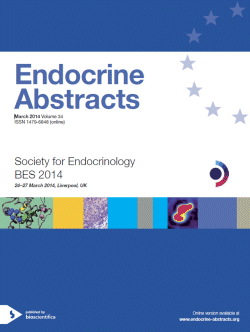Searchable abstracts of presentations at key conferences in endocrinology
Symposia
Getting excited about sugar - the brain and blood glucose control (Supported by <emphasis role="italic">Endocrine Connections</emphasis>)
ea0034s12.2 | Getting excited about sugar - the brain and blood glucose control (Supported by <emphasis role="italic">Endocrine Connections</emphasis>) | SFEBES2014
Vagal control of energy metabolism
The activity of the vagus nerve is associated with a rest and digest state, suggesting a central role in the regulation of energy homeostasis. The importance of the vagus nerve for cephalic responses to food intake, including the early release of insulin, is undisputed, and early experiments on rabbits by Claude Bernard almost 150 years ago have linked lesions in the dorsal vagal complex of the brainstem with diabetes mellitus. Similarly, many diabetic patients pre...
ea0034s12.3 | Getting excited about sugar - the brain and blood glucose control (Supported by <emphasis role="italic">Endocrine Connections</emphasis>) | SFEBES2014
Does glucagon need the brain for its effects on blood glucose?
The fundamental importance of insulin to glucose homeostasis is well recognized and most evident in type 1 diabetes where β-cell destruction and loss of endogenous insulin secretion lead to marked hyperglycaemia and ketosis. The pancreatic α-cell product, glucagon, has garnered less scientific attention. However, the demonstration that glucagon receptor null mice did not develop diabetes following near-complete chemical destruction of the pancreatic β-cell renew...




